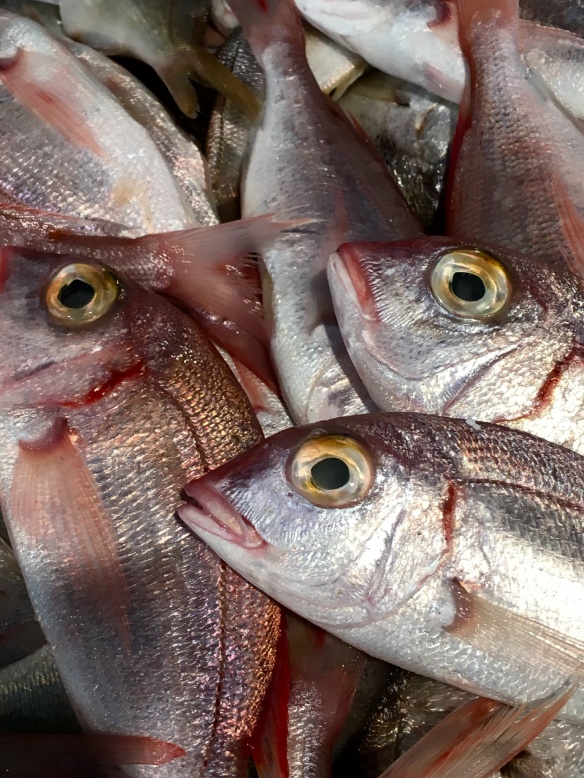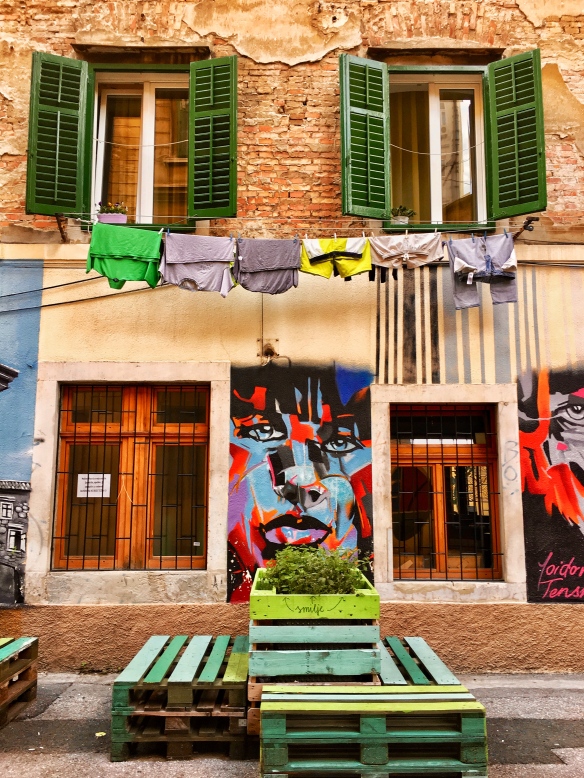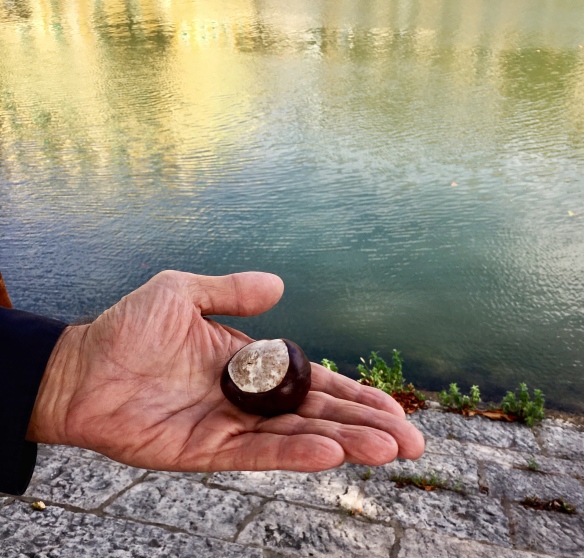“All that is left of me are ashes.
A breeze could scatter me across the world;
while a piece of me would be everywhere,
no one would notice me.”
― Tears Worn Like Jewelry
As young travelers many years ago, our friends and family would ask us to bring them cheese, wine, or traditional gifts from the countries we traveled through. I used to shop for Christmas and make gift baskets with the items I bought from abroad for my friends and family.
Last year, when we were planning our trip to the Balkan countries, a friend asked me if we were going to Rijeka, Croatia. Her father was born in Rijeka. When I responded, “yes”, I could tell that she wanted to ask me something, but she was hesitant.
“This sounds crazy and I have never asked anyone to do this. Would you mind taking my father to Rijeka and scattering him in the Fiume River? “ Now, that was a first for me! I have always returned with travel gifts, never delivered them.
So, Gino traveled with me in my jewelry bag through the Balkan countries. His daughter laughed and said he always liked to travel first class. We arrived in his hometown of Rijeka, Croatia late at night. Our Airbnb was within walking distance of the bus station, and once we lugged our suitcases up a steep flight of stairs squeezed between the cathedral and the chapel, our host was waiting patiently for us at the front door.

When Gino was born, the town was called Fiume, which means river in Italian. It has had a tumultuous past with a tug of war among neighboring countries. Until after World War I, it was alternately under Austrian, Hungarian, and Croatian rule, during which period the buildup of the port and rail connections took place. After 1918 Fiume-Rijeka became a major issue of the postwar peace settlements. At first it was yielded to the new Yugoslav state, but it was returned to Italy in 1924 after Benito Mussolini assumed power and reneged on an agreement for a free state.

Gino and his mother, father, two younger brothers, and one sister lived close to the city of Fiume in the county of Drenova. They shopped at the lively markets daily and bought fish from the busy market in Fiume.

The port of Rijeka has been an important trading and commerce port since the early 1200s. Today it is the largest port in Croatia with cargos of mainly oil, but a variety of other general cargo, and a thriving fish market.

Rijeka is a vibrant blend of old and new. It has a diverse population with the majority of people speaking Italian because it was once part of Italy.

We walked around the city with Gino in my pocket. I hoped he would guide me to the perfect spot for his resting place. I wondered if I walked the same cobblestone streets that Gino had walked many years ago.

Gino, his parents, two brothers, and one sister fled to Rome during the turbulent 1940s and lived in a refugee camp. It was during this time that Gino worked as an extra in the movie, War and Peace, and was able to steal a kiss from Kathryn Hepburn.
These were mostly political refugees, including orphans whose parents had been killed during the war, individuals and families fleeing Yugoslavia’s communist authorities.
But, in 1956, Gino and his family made the brave decision to leave everything familiar behind with the hard times, and travel to the United States. The term Istrian-Dalmatian exodus refers to the post-World War II expulsion and departure of ethnic Italians from the Yugoslav territory of Istria, as well as the cities of Zadar and Rijeka.
According to various sources, the exodus is estimated to have amounted to between some 230,000 and 350,000 people (including several thousand anti-communist Croats and Slovenes) leaving the areas in the aftermath of the conflict.The exodus started in 1943 and ended completely only in 1960.

Gino’s family settled in Connecticut. He soon married his sweetheart, and they raised two children, one girl whom is my friend. She told me that her father always wanted to return to Rijeka, and she was never able to go with him. So, this was an opportunity of kindness for me to help get Gino back home.

The banks of the Fiume River were steep and lined with tall fences. “OK, Gino,” I said, “ I am counting on you to lead me to an opening in the fence.”
And being the thoughtful and friendly soul that his daughter told me he always was, he led me to a small opening in the fence where I could return him to his birthplace.

I said a few heartfelt words. I really felt like Gino had been a part of my life as we traveled through the Balkans. I was going to miss having him with me. Ron recorded my small ceremony for Gino’s daughter, and then I gently threw his ashes into the Fiume where they plopped into the water and sank to the bottom.

A large buckeye fell from a nearby tree. I think it was a gift from Gino, so we picked up the buckeye to give to his daughter as a reminder that her father will always be with her.
The simple act of scattering Gino’s ashes enabled me to tell a very personal story about a man whom I never met, but wanted to honor for his family he left behind. I learned so much about his life as a refugee and an immigrant to the United States during a time when immigrants were accepted into our country with open arms.
Because of this simple request, I learned more about the history of Rijeka, Croatia and I could feel Gino’s silent presence as we walked through the markets and cobblestone streets where he once played as a child.
I am so glad I could play a small part in scattering Gino’s ashes. A breeze could scatter pieces of him everywhere in the world and no one would notice. And that is what his daughter said…he never wanted to be a bother to anyone, he was a very loving and humble man.

What a great story! So sad he wanted to visit Rijeka all his life and never got to it. We are such lucky folks to live in a time where travel is so easy and affordable!
Thank you for your great blog entries! Could spend hours browsing through new and old ones… Could? No! Do! 🙂 🙂 🙂
I have fallen way behind on my blog reading – sorry for this late comment. But such a lovely story, illustrated as usual with your beautiful photography. The falling of the buckeye gives me goosebumps! We’re still hopeful we can visit Croatia someday, but it’s hard to say when, now – with the current global crisis.
What a wonderful story! I have a store involving someone’s ashes as well, but not quite the same. When we bought our first house, my husband called me one day and said “Guess what I found in the attic?” Of course I’m imagining treasure of some sort, but it turned out to be the ashes of someone who had lived there previously. I don’t know if her family just decided to leave her or if she wanted to be left at the house. People asked me if I was afraid! I just laughed. It was a box of ashes. We left it with the house when we moved and I believe the people who bought the house took the ashes and had them buried.
janet
That is an amazing story. I enjoy hearing stories like this, too. When we left Nicaragua, I forgot that my friend Bobby was on the bookcase. I still haven’t told our renters that Bobby’s ashes are there. 🤗
Ha, ha! Our realtor called/emailed and said, “Did you know….” and told us they were going to take care of the ashes. We just said thanks. 🙂
I am reading this just before turning in for the day. What a beautiful bedtime story. Thank you for sharing this very special experience.
So glad you enjoyed it, Jane.
So very beautiful. I enjoyed every word, and that final buckeye was certainly nudged by a higher power. She will treasure that buckeye!
Lisa, that buckeye was definitely sent by Gino. They are good luck, too. 🙂🤗
Such a lovely story, Debbie. You’ve brought so much of the Balkan’s recent history into your tale and personalized Gino in a way that made his story a part of what every immigrant hopes for when moving to a new land: finding a home and raising a family. I’ll be spending June in Croatia and will carry a little bag of my husband’s ashes there as it was a place he always wanted to visit. It’s a comforting thought, to paraphrase your quote, “… a piece of him will be everywhere.” Thank you for sharing Gino’s story. Anita
Oh Anita. That warms my heart! I believe the connections with loved ones only grow stronger in death. Their energy is still there, just transformed and we are aware of their presence in a different form…kind of like a whisper of wind, or a ray of light. Enjoy Croatia. It is beautiful, but overwhelmed with tourists. We visited in October thinking the tourists would be gone, but there were throngs of tourists in every city we visited.
In 1969, my friend, Don and I were on a backpacking tour of Europe. On our way to Greece, we hitchhiked down the Dalmatian Coast. Your post brought back memories of a much different time. From my travel journal:
February 25 Rijeka, Yugoslavia
We take the train from Venice to the mainland and then after several rides, we arrive at the Yugoslavian border. Crossing this border is a hassle! We are riding with a very helpful Italian man who translates for us and patiently waits for nearly half an hour while our visas are issued. We finally get through and after three more rides, we arrive in Rijeka. Most people speak only Croatian (and maybe, Russian). Older people speak a little German, which doesn’t help us much, either, so we have quite a time communicating.
We find the university dining hall and get a pretty good meal for about 15 cents. We talk to a student who has one year of university German. Our conversation is not very stimulating. We find the tourist office and by means of a little old lady, we have a room in a private home for a dollar and a half. We still aren’t too sure how it happened, but here we are and the room is nice. Apparently, the price is much lower than a hotel. Tonight, we are studying German.
I love this, Skeneholm! I have always kept travel diaries, too. They are so much fun to reread. Oh, those backpacking days through Europe were a hoot. Thanks for sharing your stories. As I write more entries, please continue to share your diaries.
Our experience the next evening was a classic! From my travel journal:
February 26, Split Yugoslavia
“We arrive in Split and ask directions to the youth hostel. We take the indicated bus and find the proper place, but soon discover that, while it may be a youth hostel in the summertime, in the winter it is a university men’s residence and fully-occupied. The students are really friendly and after a lot of incomprehensible dialogue, it appears that we are being allowed to sleep for free in the beds of two students who are away at the moment. The only people in the whole place who speak English are a Pakistani and a Jordanian. Both are very nice and make us feel welcome. We are given a cup of tea and we talk for a while, It is really interesting to meet some other university students.
A senior student appears, who seems to be in some position of authority and expresses great concern about our health status. Everyone here has heard about the Hong Kong flu epidemic in North America, which is getting a lot of media coverage all over the world and he is afraid we might infect the student body. We show him our International Vaccination Certificates, which of course, say nothing about Hong Kong flu, but which look very official, nevertheless. He studies them carefully, pretending that he can actually read them and then goes away, apparently satisfied that we aren’t a health hazard.
A law student appears who asks if we can speak: Russki?… Serbski?… Croatski?…?…or possibly …Latinski…? He speaks neither English, French, Spanish nor German, but he has studied Latin. So we converse for a time – in Latin! His is much better than mine, because although I studied it for five years in high school, this is the very first time I have ever actually tried to speak it! When I come upon a word I don’t know, I ask the Jordanian in English, he asks the Yugoslavian in Croatian what the word is in Latin and then relays it back to me. What a hoot!”
Skeneholm, you inspire me to be more diligent about writing a travel diary!!! Lovely stories…
I would love to have a similar honor
It was amazing, Anne-Marie! You never know…you may be surprised and receive the same honor. Life is funny like that. I always say, life is serendipitous. Thanks for your comment.
Even I have a tear in my eyes!
Haha! Sharman, you are a hoot. You have a warm and tender heart, but you just don’t want anyone to know. 😜
Lovely story and wonderful photos! Bruno
Thank you, Bruno. There are stories everywhere in our adventures, right?
I’m glad you could play that part, too…and share it!
Thank you, Leah. I think my writing mojo is returning after a year’s hiatus. It feels so good!